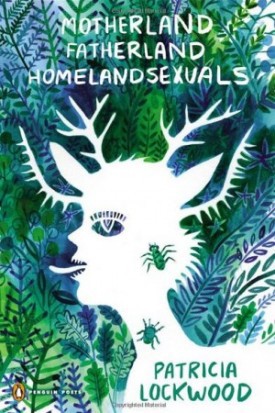Men Unsettled by Woman's Poems

Patricia Lockwood’s new book of poetry, Motherland Fatherland Homelandsexuals, came out last week. There have been a handful of reviews in mainstream outlets, like in the New York Times, where Dwight Garner calls it “a satirical work that nonetheless brings your heart up under your ears.” His criticism, such as it is, notes, “When her poems miss, which they frequently do, their ideas seem larval and merely cute.” It concludes, “little hairs on my back rose often while reading ‘Motherland Fatherland Homelandsexuals,’ as if it were the year of the big wind. That’s biological praise, the most fundamental kind, impossible to fake.”
But then are there some other reviews, and there is a mildly curious pattern to them. Here’s the first paragraph of Jonathan Farmer’s, in Slate:
Here’s the thing: For the most part, I don’t like reading Patricia Lockwood’s poems. They make me feel slow-witted and over-serious, clumsy, credulous, and uncool. They make me feel like the guy who ruins all the fun. Her poems aren’t wrong; I am that guy. But I don’t like being reminded.
And here’s Adam Plunkett at The New Yorker online:
Even the zany comic sexuality, unsettling as it can be, is never more nuanced than the brutish, broish caricature she tweets about and that tweets back at her. In “The Hornet Mascot Falls in Love,” for instance, the hornet is sexual aggression incarnate: “Oh he want to sting her…. The air he breathes is filled/with flying cheerleader parts.” It’s easier to laugh at what he represents — “astonishing abs,” sports, machismo — than to feel his sexual frustration and anger. “Revealing Nature Photographs,” a poem transposing onto nature the ways we objectify women, ends with a repulsive invitation: “Nature turned you down in high school. / Now you can come in her eye.” This is addressed to a man but written for people to laugh at him, even if the poem doesn’t evoke Nature well enough to think of her as any sort of woman, let alone one whom you repressed your anger toward. But the subtleties of men’s desires were never the point.
Lockwood’s poems are sexually explicit, ridiculous, and unconcerned with the desires of men, and thus two men seem to be made uncomfortable, one shamed by his own discomfort, the other, not so much. (Worth noting: it seems that almost every review of the book — whose most famous piece is a poem about rape — so far in a major outlet has been written by a man?) The conclusions to be drawn seem dourly straightforward. This is strange. Why do these particular poems, by this particular person, in this particular book, at this particular time, bother these particular men?
Surreal, sexually explicit poetry is not new, not even by women (lol), and it seems unlikely that these men would feel similarly discomfited by weird sex-tinged poems written by another man. Men talk about cocks in bizarre ways all the time, after all, in every medium imaginable. The first cave painting by a dude was probably of a funny-looking cock.
